The global active pharmaceutical ingredients market is part of the multifaceted pharmaceutical ecosystem driven primarily by innovation and regulatory compliance. The industry serves as the foundation for drug formulation and production. Active pharmaceutical ingredients (API) are active ingredients in medicine that produce the desired therapeutic effects. In recent years, the API market has witnessed significant growth and transformation, influenced by factors such as technological advancements, regulatory reforms, and changing healthcare landscapes.
In the early days of pharmaceutical manufacturing, drug formulations were relatively simple, and APIs were primarily sourced from natural substances. However, with the advent of synthetic chemistry and molecular biology, the landscape of API production underwent a paradigm shift. Pharmaceutical companies began to invest in research and development to discover novel APIs, leading to the rise of innovative drug therapies.
Access the Active Pharmaceutical Ingredients Market Size, Share & Trends Analysis Report 2024-2030, published by Grand View Research
The active pharmaceutical ingredients market size is pegged at USD 253 billion in 2024. This is expected to reach USD 353 billion by 2030, growing at a compound annual growth rate (CAGR) of 5.75% between 2024 and 2030. Technological advancements, such as continuous manufacturing, process automation, and artificial intelligence, are revolutionizing API production, enabling faster, cost-effective, and scalable manufacturing processes. Furthermore, the growing demand for biopharmaceuticals, personalized medicine, and specialty APIs opens up new avenues for market expansion and diversification.
What is Driving the Market?
The API market is primarily driven by factors such as increasing healthcare expenditure, aging populations, and the prevalence of chronic diseases. The COVID-19 pandemic has underscored the importance of resilient and diversified supply chains, prompting pharmaceutical companies to reassess their sourcing strategies and invest in local manufacturing capabilities.
Advancements in areas such as gene therapy, RNA-based therapeutics, and nanotechnology are expected to shape the future landscape of the API market, offering opportunities for innovation and differentiation. Collaboration and partnerships between pharmaceutical companies, academic institutions, and technology providers are also playing a crucial role in driving R&D efforts and bringing novel APIs to the market.
Market Opportunities
The increasing demand for biopharmaceuticals, including monoclonal antibodies, recombinant proteins, and cell and gene therapies, presents lucrative opportunities for API manufacturers. Biologics require specialized manufacturing capabilities and expertise, offering higher profit margins and barriers to entry compared to traditional small-molecule APIs. The rise of personalized medicine and niche therapeutic areas creates demand for specialty APIs tailored to specific patient populations and disease indications.
The expansion of the pharmaceutical market in emerging economies, such as China, India, Brazil, and Southeast Asia, presents vast growth opportunities for API manufacturers. Rising disposable incomes and expanding access to healthcare services drive demand for pharmaceuticals in these countries. Government initiatives to promote domestic manufacturing and improve healthcare infrastructure also stimulate market growth and investment in API production facilities.
Technological advancements, such as process automation, also offer opportunities to enhance efficiency, reduce costs, and accelerate time-to-market for APIs. Continuous manufacturing enables real-time monitoring and control of the production process, improving product quality and scalability while minimizing waste and resource consumption.
Regulatory reforms aimed at streamlining approval processes and harmonizing standards across regions can create a more conducive environment for API manufacturers. Initiatives such as the FDA's Drug Master File (DMF) system, Mutual Recognition Agreements (MRAs), and regulatory convergence efforts promote consistency, transparency, and efficiency in regulatory oversight, facilitating market access and international trade.
Order Your Sample Copy of the Active Pharmaceutical Ingredients Market Size, Share & Trends Analysis Report By Type Of Synthesis (Biotech, Synthetic), By Type Of Manufacturer (Captive, Merchant), By Type, By Application, By Type Of Drug, By Region, And Segment Forecast to 2024 - 2030
Challenges Faced by the Active Pharmaceutical Ingredients Market
The API market is subject to stringent regulations enforced by various regulatory bodies of different countries, including the FDA, EMA, and others. Compliance with Good Manufacturing Practices (GMP), International Conference on Harmonization (ICH) guidelines, and country-specific regulations are complex and costly. Meeting these standards requires substantial investments in quality control systems, documentation, and facility upgrades.
Ensuring the quality, purity, and consistency of APIs is paramount for drug safety and efficacy, which is another major challenge to the market. Maintaining stringent quality control standards throughout the manufacturing process can be challenging. Factors such as raw material variability, process deviations, and equipment malfunctions can lead to product defects and regulatory non-compliance.
The market is also characterized by pricing pressures. The pharmaceutical industry is highly competitive, with constant pressure to reduce costs and improve efficiencies. This often leads to downward pricing pressures on APIs, especially for generic drugs. API manufacturers must navigate pricing negotiations with pharmaceutical companies while balancing profitability with market competitiveness. Additionally, fluctuations in raw material costs and regulatory changes can further impact pricing dynamics.
The API market is vulnerable to intellectual property (IP) infringement, including patent infringements and unauthorized production of generic equivalents. API manufacturers invest significant resources in R&D to discover and optimize novel APIs, but protecting intellectual property rights is crucial for safeguarding innovation and preserving market exclusivity.
Conclusion
The API industry serves as the building block for drug development and manufacturing. Despite facing challenges such as regulatory scrutiny and supply chain vulnerabilities, the market continues to evolve and innovate, driven by technological advancements and changing healthcare needs. By embracing technological innovation, API manufacturers can navigate challenges and capitalize on opportunities. They can drive sustainable growth and competitive advantage in the dynamic nature of the pharmaceutical industry.
Dr. Reddy’s Laboratories Ltd., Teva Pharmaceutical Industries Ltd., Cipla Inc., Sun Pharmaceutical Industries Ltd., AbbVie Inc., Sandoz International GmbH (Novartis AG), Viatris Inc., Aurobindo Pharma, Fresenius Kabi AG, and STADA Arzneimittel AG are some of the key companies in the active pharmaceutical ingredients market.
Explore Horizon, the world's most expansive market research database
About Grand View Research
Grand View Research, U.S.-based market research and consulting company, provides syndicated as well as customized research reports and consulting services. Registered in California and headquartered in San Francisco, the company comprises over 425 analysts and consultants, adding more than 1200 market research reports to its vast database each year. These reports offer in-depth analysis on 46 industries across 25 major countries worldwide. With the help of an interactive market intelligence platform, Grand View Research helps Fortune 500 companies and renowned academic institutes understand the global and regional business environment and gauge the opportunities that lie ahead.
Contact:
Sherry James
Corporate Sales Specialist, USA
Grand View Research, Inc.
Phone: 1-415-349-0058
Toll Free: 1-888-202-9519
Email: sales@grandviewresearch.com
Web: https://www.grandviewresearch.com







